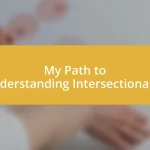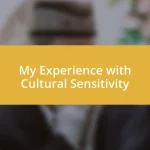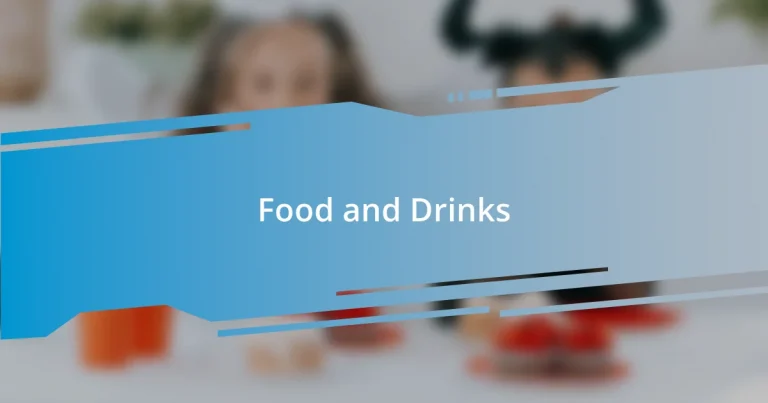Key takeaways:
- Mental health awareness is crucial for reducing stigma and promoting open conversations, enabling individuals to seek support without shame.
- Advocacy drives policy changes, enhances access to resources, and builds community connections, fostering an environment of support and belonging.
- Sharing personal stories and experiences can inspire others, creating a ripple effect that encourages discussions about mental health and encourages healing.
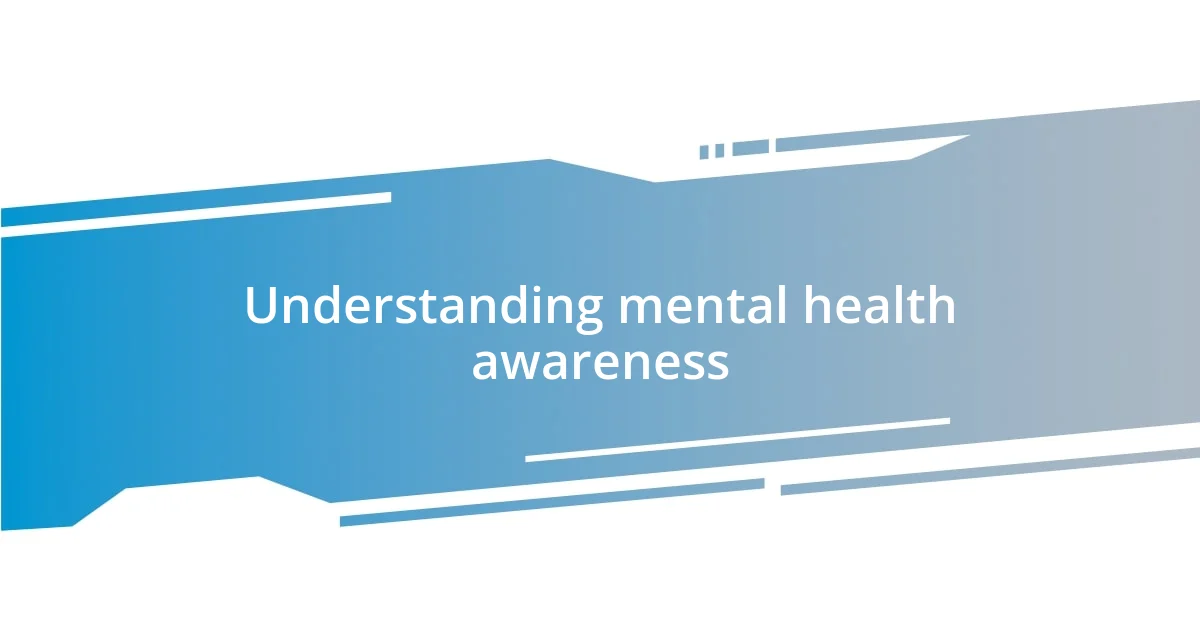
Understanding mental health awareness
Understanding mental health awareness is pivotal in breaking down stigma and fostering open dialogues. I remember a time when I hesitated to share my struggles, worrying about how others would perceive me. Have you ever felt that way? It’s a common fear, but addressing mental health awareness empowers us to confront these feelings together.
One key aspect of mental health awareness is recognizing that mental health is just as important as physical health. It was a revelation for me when I learned that even the best of us can face challenges; mental health issues do not discriminate. How often do we truly check in with ourselves and each other in our busy lives?
Moreover, mental health awareness encourages early intervention and support systems. I’ve seen friends flourish simply because they felt safe discussing their mental health with someone who understood. Imagine if everyone felt that support—how different would our communities be? Awareness can open doors to healing and connection, ultimately enriching our lives.
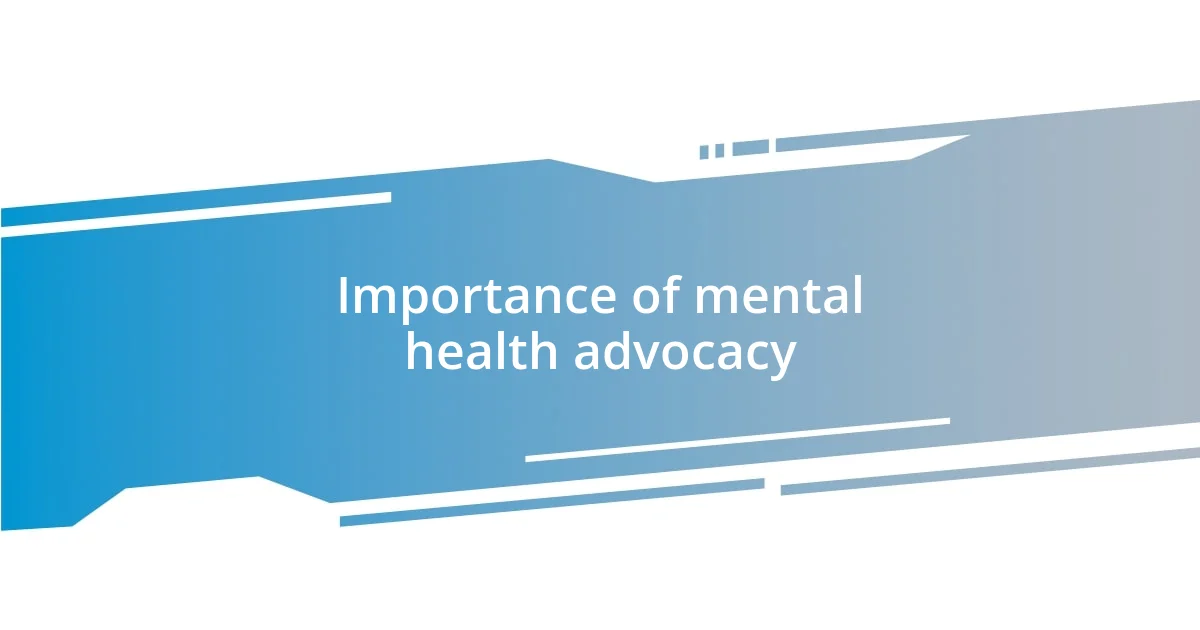
Importance of mental health advocacy
Mental health advocacy plays a crucial role in shifting societal attitudes. Personally, I’ve witnessed how simple conversations about mental health can transform the atmosphere around us. When someone speaks openly about their struggles, others begin to feel they can share too—creating a ripple effect. Have you ever noticed how one person’s courage can light up a room of hesitant voices?
The importance of advocacy cannot be understated; it serves as the backbone for policy changes and better resources. I remember attending a community meeting where mental health resources were discussed. The passion of advocates who shared their stories truly resonated with everyone, pushing us to demand more from our local authorities. Isn’t it powerful to think that a collective voice can lead to actual change?
Furthermore, mental health advocacy fosters a sense of belonging and community support. I recall when a local organization organized workshops that brought people together to discuss their experiences. The laughter and tears shared in those spaces created bonds that seemed almost magical. Advocacy isn’t just about awareness; it’s about connection. It reminds us that we are not alone in our struggles.
| Aspect | Impact of Mental Health Advocacy |
|---|---|
| Stigma Reduction | Encourages open conversations, leading to a more supportive environment. |
| Policy Influence | Drives improvements in mental health services and funding. |
| Community Connection | Creates relationships that empower individuals to seek help. |
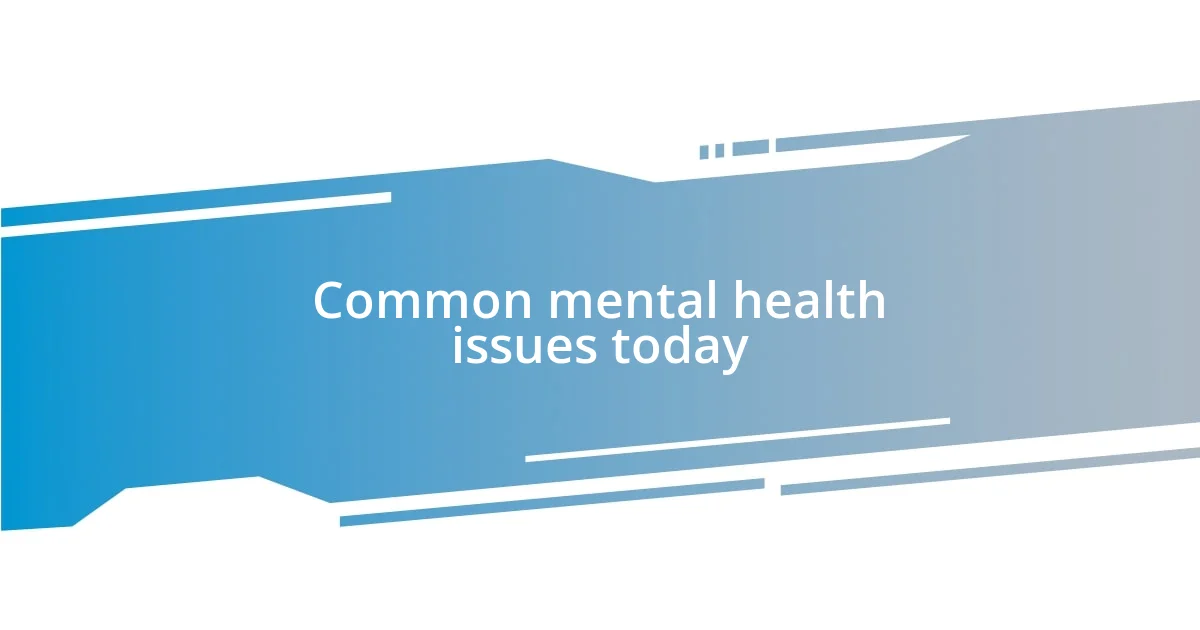
Common mental health issues today
Common mental health issues today are more prevalent than ever, influencing diverse populations across various age groups. From my own observations, it’s evident that many people are grappling with conditions such as anxiety and depression, which can significantly impact daily life. For instance, I often find myself chatting with friends who express feeling overwhelmed, and it’s striking how these discussions reveal just how common these experiences are.
Here’s a brief overview of some common mental health issues facing individuals today:
-
Anxiety Disorders: Characterized by excessive worry or fear that can interfere with daily activities. I’ve had friends who experience panic attacks, and it’s heartbreaking to see how it paralyzes them during everyday moments.
-
Depression: A pervasive condition causing persistent sadness and loss of interest. I remember going through a phase in my life where even small tasks felt monumental, and it took every ounce of energy to push through.
-
Bipolar Disorder: This disorder leads to extreme mood swings, including emotional highs (mania) and lows (depression). A close friend of mine navigates this condition, and their journey has taught me the importance of understanding and support.
-
Eating Disorders: These involve unhealthy eating habits and can range from anorexia to binge eating. My heart aches when I hear stories about young individuals feeling pressure to conform to unrealistic body standards.
-
Post-Traumatic Stress Disorder (PTSD): Often a result of experiencing or witnessing traumatic events. I recall a colleague who bravely opened up about their PTSD, shedding light on its profound effects.
-
Obsessive-Compulsive Disorder (OCD): Involves unwanted repetitive thoughts and behaviors. A family member of mine struggles with this, and it’s eye-opening to recognize how it shapes their daily routine.
Understanding these common issues can foster greater empathy and connection among us, allowing those affected to feel seen and heard.
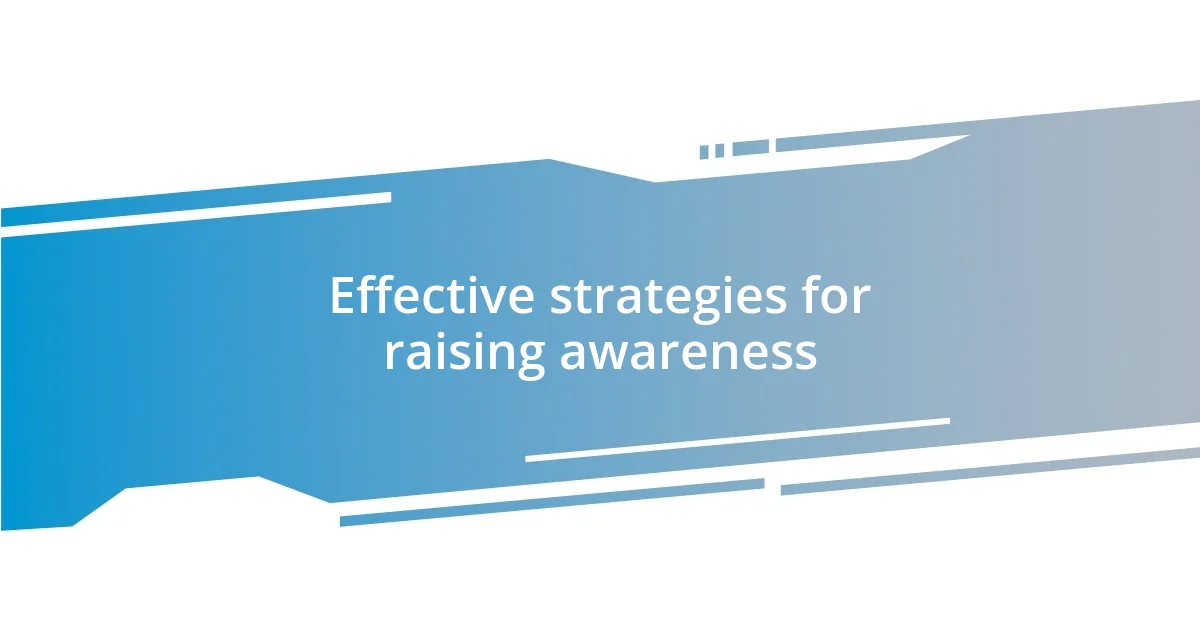
Effective strategies for raising awareness
One of the most effective strategies I’ve found for raising mental health awareness is the power of storytelling. When I’ve taken part in panel discussions or even casual chats where personal stories are shared, I’ve seen firsthand how these narratives resonate deeply with listeners. Have you ever felt a chill as someone recounts their journey, making you realize you’re not alone in your struggles? These moments can ignite change in perceptions and encourage others to open up too.
Engaging local communities through events is another powerful way to spread awareness. I vividly remember a mental health fair where various workshops and activities brought people together to learn and share. The excitement buzzing in the air felt contagious; people were learning new coping strategies and discussing ways to support friends and family. It was inspiring to witness how these events foster community connections and empower individuals to advocate for themselves and others.
Finally, leveraging social media can create an immense impact when raising awareness about mental health. I often share articles, personal reflections, or resources on my platforms. Once, a simple post I made on my experience with anxiety sparked a conversation that drew in several friends who were ready to share their own stories. Isn’t it fascinating how a single post can foster dialogue and help others realize they’re not alone? By being authentic and vulnerable online, we can encourage a broader discussion about mental health and reduce the stigma surrounding it.
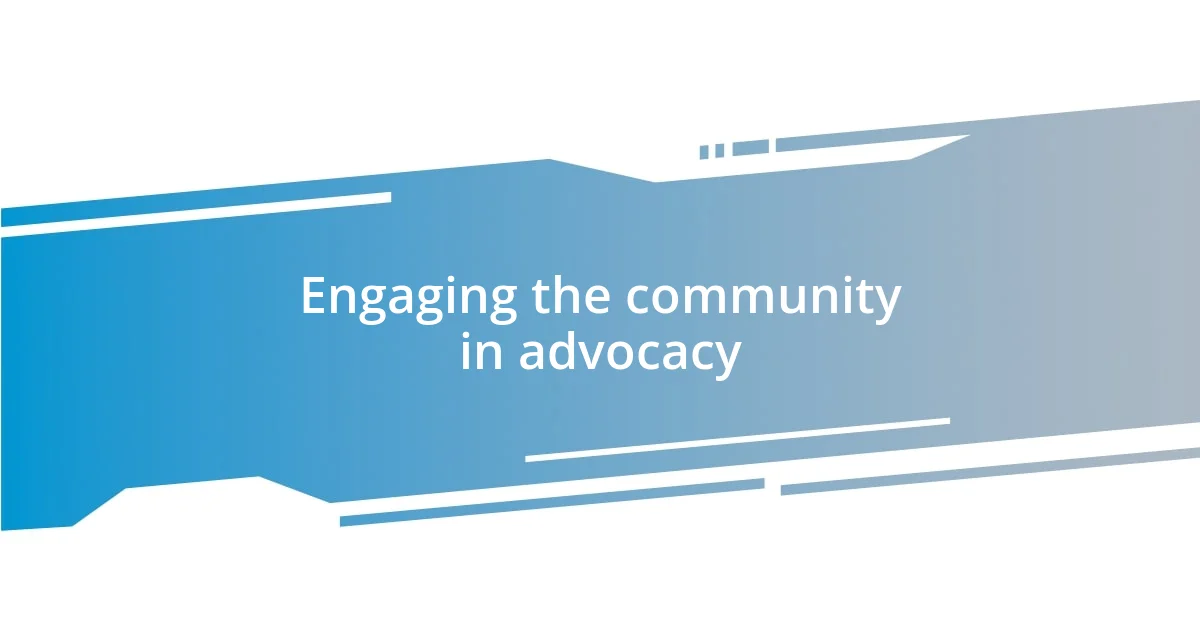
Engaging the community in advocacy
Engaging the community in advocacy requires a heartfelt approach. I remember attending a supportive gathering where individuals shared their mental health challenges in an open forum. The atmosphere was charged with empathy and understanding, and I found myself reflecting on my journey as I heard others speak. Isn’t it remarkable how vulnerability can breed connection? By creating safe spaces for these conversations, we cultivate a community of acceptance and support.
Another powerful way to engage the community is by partnering with local organizations. I once collaborated on a campaign with a nearby school to host mental health workshops. The enthusiasm from both parents and students was palpable, demonstrating that when we unite our efforts, we amplify our message. How often do we underestimate our collective strength? Together, we can reach a wider audience and offer resources that empower individuals with knowledge and tools for self-advocacy.
Lastly, I genuinely believe that art can be a profound channel for community engagement. One memorable experience was when a friend organized an art exhibit focused on mental health themes. Each piece told a unique story, sparking conversations that might not have happened otherwise. Have you ever felt moved by a painting or song in a way that resonated with your own experiences? Art can break down barriers, making the topic of mental health more relatable and accessible, inviting everyone to participate in the discourse.
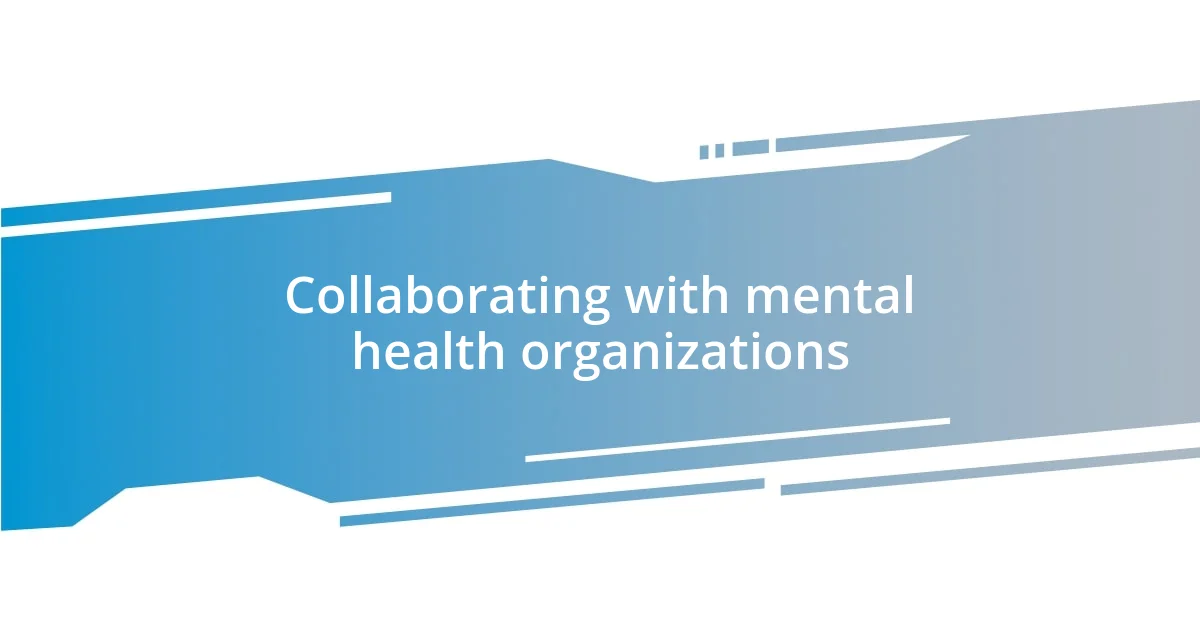
Collaborating with mental health organizations
Collaborating with mental health organizations can significantly amplify our collective impact on awareness efforts. I recall partnering with a well-established mental health charity for a community event, which added both credibility and resources to our outreach. The synergy was incredible; it felt like we were standing on the shoulders of giants who had navigated similar challenges before us. Isn’t it inspiring to think about the knowledge exchange that occurs when passionate individuals come together?
Working alongside these organizations allows for a sharing of experiences and expertise that enriches our advocacy. I vividly remember a brainstorming session where representatives from different organizations brought their unique perspectives to the table. It was enlightening to see how each person’s background shaped their approach to mental health. Have you ever noticed how collaboration can lead to innovative ideas that wouldn’t have emerged in isolation? That day, we developed strategies that combined our strengths, leading to a more comprehensive awareness campaign.
Moreover, the connections I’ve built through these collaborations have been invaluable. One time, I reached out to a mental health organization to help promote a community workshop, which turned into a fruitful partnership. They not only provided valuable resources but also connected me with individuals whose stories mirrored my own. This shared experience created an authentic dialogue that deeply resonated with attendees. Don’t you think it’s amazing how collaboration can turn a simple idea into something much more powerful? Together, we create a ripple effect that reaches far beyond what we could achieve alone.
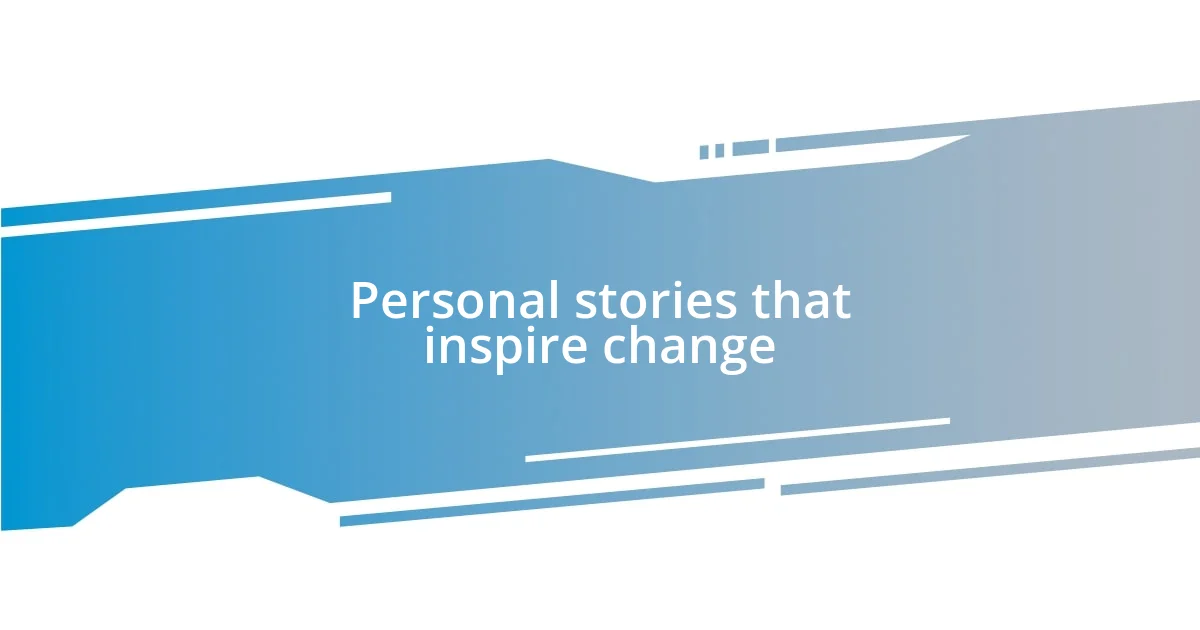
Personal stories that inspire change
Sharing personal stories can be a transformative experience for both the storyteller and the listener. I remember a poignant moment when a friend opened up about her struggle with anxiety during a small gathering. Her words were raw and honest, sparking tears and laughter in equal measure. It’s incredible how one person’s vulnerability can encourage others to share their own experiences, isn’t it? In those moments, we realize that we are not alone in our struggles—a powerful reminder of our shared humanity.
One particular story that truly moved me was from a young man who overcame depression through a support group. He spoke passionately about how connecting with others who understood his journey fostered hope in him during his darkest days. Hearing his account made me reflect on the importance of community in healing. Have you ever considered how sharing such deeply personal experiences can inspire others to seek help? This ripple effect often leads to more individuals taking that brave step towards talking about their mental health.
I firmly believe that our stories hold great power for change. I once participated in a local storytelling event where I recounted my own journey with mental health challenges. The atmosphere was charged with energy; each narrative resonated in the room, creating an intimate bond among strangers. It became clear to me that when we share our journeys, we remove the stigma surrounding mental health. Isn’t it amazing how speaking our truths can pave the way for greater understanding and compassion? Each story shared is a seed planted, nurturing a culture of openness and awareness in our communities.





